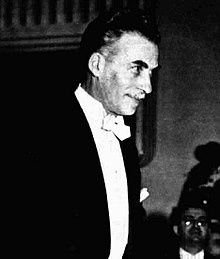

Mario Rossi (29 March 1902, Bitetto – 29 June 1992, Rome) was an Italian conductor celebrated for his precise and insightful interpretations across a diverse repertoire, spanning from Italian opera classics to Russian modernists like Prokofiev and the German operatic classicist Christoph Willibald Gluck.
Rossi studied composition in Rome under Ottorino Respighi and conducting with Giacomo Setaccioli, graduating in 1925. Shortly after, he became assistant conductor to Bernardino Molinari, marking the beginning of a distinguished career. In 1937, he was appointed resident conductor of the Maggio Musicale Fiorentino in Florence, making his debut with Mascagni’s Iris. The following year, he conducted the world premiere of Gian Francesco Malipiero’s Antonio e Cleopatra.
Throughout his career, Rossi conducted in all of Italy’s major opera houses, firmly establishing himself in the standard Italian repertoire while also championing the revival of forgotten works. His efforts brought renewed attention to operas such as Galuppi’s Il filosofo di campagna, Monteverdi’s Il ritorno d’Ulisse in Patria, and Piccinni’s La buona figliuola.
From 1946 to 1969, he served as the chief conductor of the RAI Orchestra in Turin, elevating the ensemble to international prominence. His leadership led to prestigious guest appearances in Brussels (1950), Vienna (1951), and Salzburg (1952). Among his most acclaimed recordings are Il matrimonio segreto, Il barbiere di Siviglia, Don Pasquale, Un ballo in maschera, Otello, and Falstaff. His performances of Gluck’s Paride ed Elena (1968) and Prokofiev’s Alexander Nevsky (1954) stand as remarkable testaments to his ability to navigate vastly different musical styles with authenticity.
Despite being one of the lesser-known great conductors of the 20th century, Rossi was extraordinary in his stylistic versatility. He delivered Gluck with the same authenticity as Verdi, a rare achievement even among the finest conductors, who often excel only within certain national or historical traditions. His universality in interpretation set him apart, making him one of the most stylistically diverse and underappreciated conductors of his time.
I agree to the terms outlined below:
You agree to upload and assign Mosqpedia Database the rights to use the content worldwide and in perpetuity across all current and future media platforms. Mosqpedia Database may edit, copy, adapt and translate your contribution.
The content will be distributed under the Creative Commons Attribution-Deed – Attribution-NonCommercial-NoDerivatives 4.0 International – Creative Commons
All data will be stored in line with data protection regulations.
I agree to the terms outlined below:
You agree to upload and assign Mosqpedia Database the rights to use the content worldwide and in perpetuity across all current and future media platforms. Mosqpedia Database may edit, copy, adapt and translate your contribution.
The content will be distributed under the Creative Commons Attribution-Deed – Attribution-NonCommercial-NoDerivatives 4.0 International – Creative Commons
All data will be stored in line with data protection regulations.